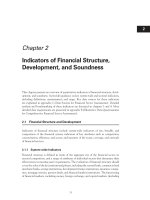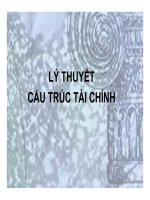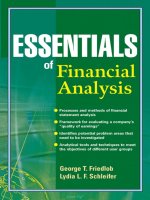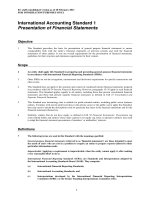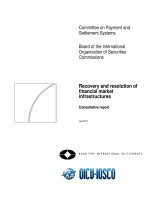Lecture 2 statment of financial position(1)
Bạn đang xem bản rút gọn của tài liệu. Xem và tải ngay bản đầy đủ của tài liệu tại đây (542.33 KB, 27 trang )
Lecture 2
The Statement of Financial Position
‘A snap-shot of the company’s wealth at one moment in time’
Learning outcomes
Understand the different terminology used
Explain the nature and purpose of the three main financial statements
For “The Statement of Financial Position”
Be able to classify individual items on the statement of financial position.
Be able to prepare a statement of financial position.
Terminology
This module is taught using the terminology used under IFRS, however it is important to be aware of the old terminology, often used by
small UK companies as this is often used interchangeably…
International Standards
UK GAAP
Statement of financial position
Balance Sheet
Income Statement
Profit & Loss statement
Inventory
Stock
Trade receivables
Debtors
Trade payables
Creditors
Non Current Assets
Fixed Assets
The major financial statements – an overview
Income Statement (…for period ended…)
Statement of Financial Position (…as at…)
Cashflow Statement (…for period ended…)
The relationship between the statement of financial position, the income statement and the cash flow
statement
Statement of financial position
Statement of financial position
Statement of financial position
Income statement
Income statement
Statement of cash flows
Statement of cash flows
Period 1
Period 2
Time
The Statement of Financial Position
Assets
what the company owns
have value
Claims
what the company owes.
Equity, claims by the owners
Liabilities, claims by other individuals & organisations (except the owners )
Classifying Assets
Current
Non-current
Current assets
Held for sale or consumption during the business’s operating
cycle
Expected to be sold within the next year
Held principally for trading
They are cash or near equivalents to cash
The circulating nature of current assets
Inventories
(stock)
Sell stock to customers
Buy stock
Trade receivables
Cash
(trade debtors)
Invest cash!
a
Tr
d
e
er
ce
b
i va
le
p
sh
ca
y
a
Non-current Assets
A non-current asset is acquired by the business to generate income over a
considerable period of time.
Which of the following assets are current or non-current assets?
Current
Non Current
Non Current
Non Current
Non Current
Cash at bank
Non Current
Chairs, desks and office equipment
Cars for the sales team
Non Current
A manufacturing production line
Delivery Vans
Half completed inventory.
Factory and surrounding land
Current
Goodwill purchased from a business take-over
Computer equipment
Non Current
Inventories of raw materials
Debts owed to the company by customers
Current
Current
Classifying Claims
Current liabilities
Non-current liabilities
Equity
Current Liabilities
In general, amounts payable within one year
For Example:
•
Debts owed to suppliers for goods (‘Trade Payables’)
•
Bank Overdraft
•
Accrued expenses
Working Capital
Working Capital is the capital used to finance the day to day running of
the business.
It can be defined as current assets – current liabilities.
Or
… how much short term cash the company has access to.
Non-current liabilities
In general, amounts payable in more (not current liabilities) than
one year
•
A long term loan
•
Mortgage
•
Lease
Equity and Reserves
Generally Claims belonging to the owners of the enterprise
For Example
Owners capital or share capital
Profits for this year
Retained Profits from previous years
The statement of financial position equation:
plus
equals
Assets
Equity
Liabilities
The effect of trading operations on the statement of financial position
plus (minus)
equals
Assets
Equity
plus
Profit
(Loss)
Liabilities
Exercise on the Accounting Equation.
Bethan Willow put £15,000 into a bank account on 1st January 2010 in order to
commence a business, Willow Developments . The business borrowed a further
£5,000 from the bank, purchased a van for £7,000 and other equipment for £2,500.
Inventory costing £9,000 is purchased out of the bank.
During the first month they made a profit of £1,000 which was put in the bank and
they repaid £500 of the loan.
Example of the Accounting Equation.
Remember: Assets = Claims (ie equity and liabilities)
This must always hold true
Transaction 1: Initial Capital Deposit
Transaction 2: Bank Loan
Transaction 3: Van Purchase
Transaction 4: Other equipment purchase
Transaction 5: Inventory Purchase
Transaction 6: Profit
Transaction 7: Loan repayment
Example of the Accounting Equation – Further Practice
Accounting & Finance An introduction McLaney & Atrill
th
(7 Edition)
Example 2.2, page 49, Jerry & Co
The Statement of Financial Position-structure:
ASSETS
Non-current assets
Current Assets
Total Assets
EQUITY & LIABILITIES
Equity
Non-current liabilities
Current liabilities
Total Equity & Liabilities
Format - see example 2.3, page 54
Brie Manufacturing
Statement of financial position as at 31 December 2011
£000
ASSETS
Non-current assets
Property
45
Plant and equipment
30
Motor vans
19
94
Current assets
Inventories
23
Trade receivables
18
Cash at bank
12
53
Total assets
147
Brie Manufacturing
Statement of financial position as at 31 December 2011 (continued)
£000
EQUITY AND LIABILITIES
Equity
60
Non-current liabilities
Long-term borrowings
50
Current liabilities
Trade payables
Total equity and liabilities
37
147
Example: Magnum Engineering
